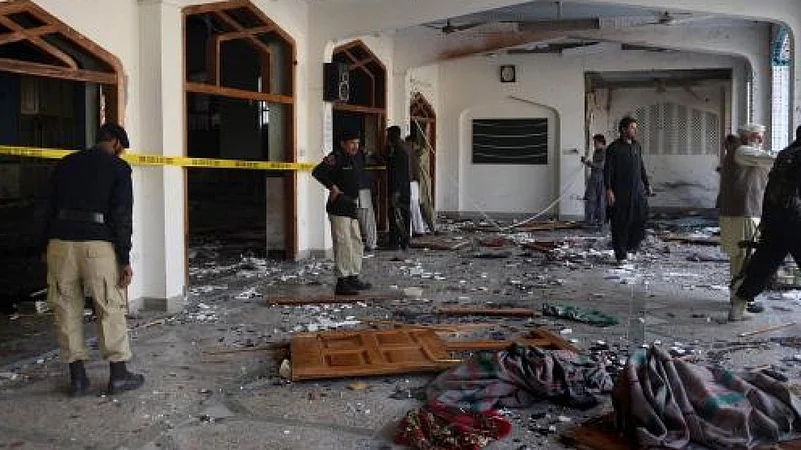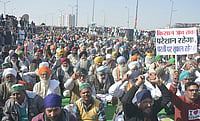The Tehrik-i-Taliban Pakistan (TTP) and allied terrorists groups killed a total of 179 people in Pakistan in 2022, according to a report.
In 2023, the TTP killed over 100 in January alone in a mosque in Peshawar in the worst attack in recent years in Pakistan. At least a dozen or more casualties have also been reported in attacks attributed to the TTP.
At a time when Pakistan is recovering from devastation of last year's floods and is dealing with ongoing financial crisis, the security nightmare created by the TTP is an added blow to the country.
However, while people continue to die in attacks, the TTP is not a villain that has emerged by itself. The TTP and its partners have been supported and propped by the Pakistani state over the years as part of its support to Islamist terrorist groups in South Asia and elsewhere.
Here we explain what is TTP, what are its objectives, the role of Pakistan in propping it, and how it's frustrating Pakistan now.
What's Tehrik-i-Taliban Pakistan, what it wants?
The Tehrik-i-Taliban Pakistan (TTP) is an outlawed organisation in Pakistan. It was founded in 2007 as an umbrella group of Islamist militants.
The TTP is rooted in the Afghanistan War and was part of the Afghan Taliban-led struggle against the US-led international military presence. Besides fighting the West in Afghanistan, the TTP is also opposed to the Pakistani state.
The US National Counterterrorism Center (NCTC) says, "TTP's stated objectives are the expulsion of Islamabad's influence in the Federally Administered Tribal Areas (FATA) and neighboring Khyber Pakhtunkhwa Province in Pakistan, the implementation of a strict interpretation of sharia throughout Pakistan...TTP leaders also publicly say that the group seeks to establish an Islamic caliphate in Pakistan that would require the overthrow of the Pakistani Government."
The TTP maintains links with the Afghan Taliban and Al Qaeda, according to think tank Counter Extremism Project (CEP).
The CEP says, "As an ally of the Afghan Taliban, the TTP also fought the US-backed Afghan government prior to the latter’s defeat in August 2021. The TTP was founded in late 2007 by a group of Pakistani militants who had previously fought in Afghanistan alongside both the Taliban and Al Qaeda, and the group has maintained close ties to both organizations since."
Researcher Abdul Sayed noted in an article that the TTP emerged out of the post-9/11 attacks jihadist politics.
"The group is a by-product of Al Qaeda's jihadi politics in Afghanistan and Pakistan after 9/11. The TTP still has covert links with al-Qaeda and has declared that it looks to Afghan Taliban leaders as its own while enjoying safe haven under Taliban rule in Afghanistan," noted Sayed in an article for Carnegie Endowment for International Peace.
Sayed further noted, "TTP members thus began sheltering the Afghan Taliban, Al Qaeda, and other militant allies who were fleeing the Afghanistan conflict. Yielding to US pressure, the Pakistani government eventually cracked down on the safe havens, but its violent response ultimately prompted these Pakistani jihadists to band together and more formally ally with Al Qaeda and the Afghan Taliban. This eventually led to the establishment of the TTP in 2007."
How Pakistan is both culprit and victim
With hundreds of people dying every year in jihadist violence, Pakistan is definitely a victim of terrorism.
However, Pakistan has for decades supported terrorism as a state policy. The same TTP that's killing scores of Pakistanis today was supported for years by Pakistan. The same Afghan Taliban that's refusing to remove TTP's safe havens inside Afghanistan was supported by Pakistan. The then-Prime Minister Imran Khan had publicly cheered the Taliban takeover of Afghanistan.
Now the Taliban-Pakistan relationship is also stressed over Taliban not acting against the TTP. The Taliban has taken a leaf out of the Pakistan's book to claim that there are no TTP settlements on its soil.
Highlighting Pakistan's relationship with jihadists, terrorism expert Bill Roggio wrote that the state has played a double game between the United States and terrorist groups.
He wrote in The Sunday Guardian, "While Pakistan has helped the United States capture and kill top Al Qaeda leaders and operatives sheltering in the country, it has played a double game by funding, arming, advising, training, and providing safe haven to the Afghan Taliban. The Afghan Taliban in turn provided support for Al Qaeda and other allied terror groups, including the Movement of the Taliban in Pakistan, which is responsible for killing tens of thousands of Pakistan civilians, soldiers, policemen, and government officials during its 15-year long war with the Pakistani state."
Roggio noted that such a strategy comes from Pakistan's perception of India as its main enemy.
"The Pakistani state fully understands that supporting the Afghan Taliban is a direct threat to its people, and yet cynically continues to support the Afghan Taliban in order to maintain Pakistan’s 'strategic depth' against what Islamabad perceives to be its real enemy: India. The cycle, which I call the wheel of jihad, continues unabated to this day," noted Roggio, a Senior Fellow at Foundation for Defense of Democracies (FDD).
Tehrik-i-Taliban Pakistan's relationship with Afghan Taliban
The Tehrik-i-Taliban Pakistan's (TTP) relationship with Afghan Taliban evolved over the years. But a relationship continues to be there.
Sayed noted in the Carnegie article that the TTP claimed to be an extension of the Afghan Taliban at the time of its inception. However, the TTP evolved to develop a symbiotic relationship with the Afghan Taliban. Roggio in The Long War Journal highlighted that the TTP and Afghan Taliban both helped each other over the years.
Roggio noted, "The Afghan Taliban sheltered in Pakistan in areas controlled or influenced by the TTP, while the TTP provided manpower to fight the U.S., NATO and Afghan forces. The TTP’s current emir, Mufti Noor Wali Mehsud, as well as its previous leaders, have sworn allegiance to the Afghan Taliban’s top leader.
"Meanwhile, the TTP – whose singular goal is to to establish an Islamic Emirate of Pakistan just as its partners did in Afghanistan – has mercilessly attacked the Pakistani state and its civilians. The TTP often retreats into Afghanistan, with the support of the Afghan Taliban, whenever the Pakistani military dials up pressure."
Pakistan response to TTP unlikely to improve: Expert
The Tehrik-i-Taliban (TTP) struck a mosque in high-security Police Lines area of Peshawar on January 30.
Over 100 were killed and more than 200 were injured, the vast majority of the casualties being security personnel, including officers.
The TTP has increasingly mounted bold attacks on police stations and security establishments in Pakistan in recent weeks.
Until November, the TTP was negotiating with the Pakistani government but then it announced the end of ceasefire and announced an offensive against the Pakistani state. Hundreds have been killed since then.
The Pakistani government had hoped that the rise of Aghan Taliban to power in Kabul would help tame TTP but that has not happened. Top Pakistani ministers have visited Kabul but there has not been any substantial dealmaking yet.
The Pakistani state is frustrated and desperate for a breather as it's dealing with a double whammy of financial and security crisis. But even in such conditions, its response is unlikely to change, according to Pakistan affairs expert Asfandyar Mir.
"Pakistan’s response to the TTP's resurgence remains incoherent — and it is unlikely to improve in the near-term. After downplaying the TTP’s strength as well as the Taliban’s influence on and relationship with TTP for several years, Pakistani leaders now seem to be contending with the depth of Taliban support for the TTP. Yet Pakistani officials still seem to be searching for a deal — ideally a cease-fire arrangement — through the Taliban...But the Taliban’s uncompromising commitment to the TTP means that Pakistan has to either ignore the violence or concede to the TTP to maintain a relationship with the Taliban," Mir is quoted as saying in an article by United States Institute for Peace (USIP).
He further said, "Another key factor shaping the Pakistani response is the country’s deteriorating economy, which is on the brink of a default. That limits Pakistan’s military options. Pakistan can carry out raids and undertake defensive actions inside the country, but it doesn’t have the resources for a sustained high-intensity campaign."
Therefore, after decades of fuelling terrorism, the Pakistani state is trapped in a problem of its own making. Ironically, nowadays it's not India complaining of cross-border terrorism but Pakistan that maintains that TTP personnel cross into Pakistan from Afghanistan.
As former US Secretary of State Hillary Clinton said, you cannot keep snake in your backyard and hope it would only bite your neighbour.


























